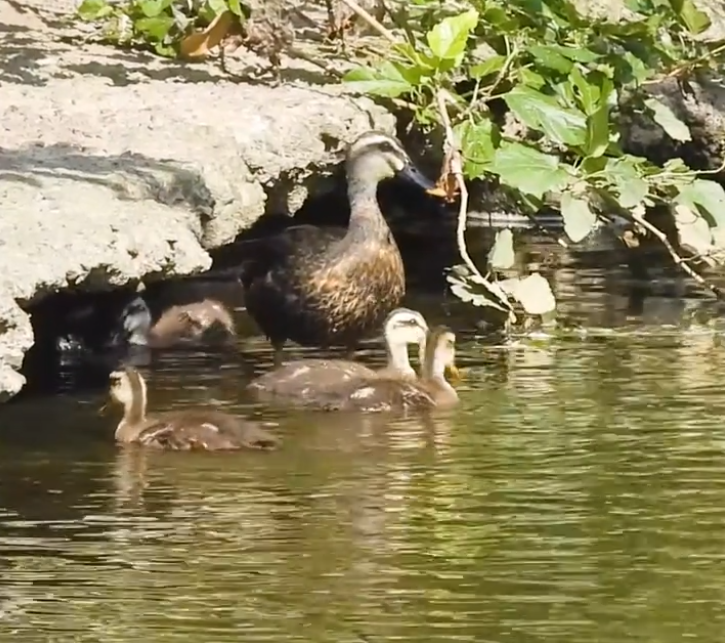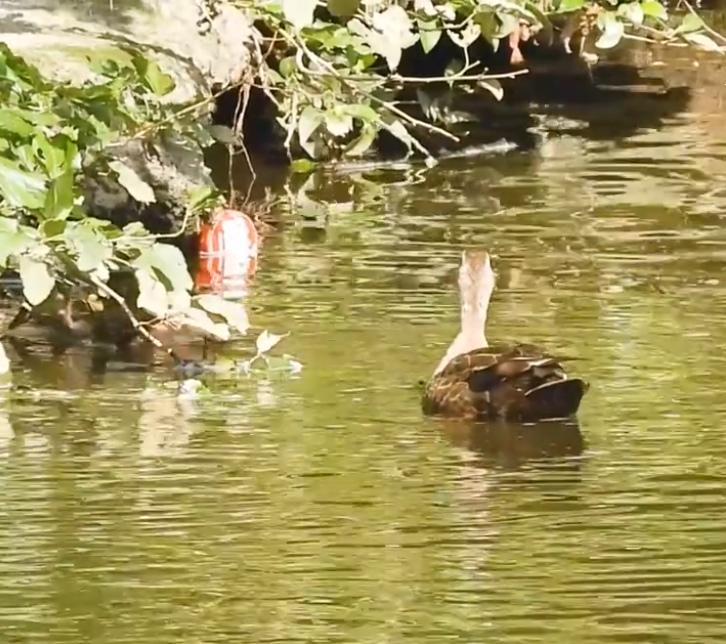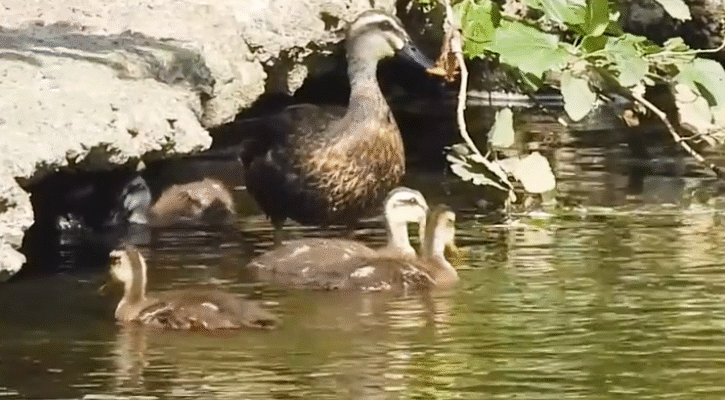
It was a peaceful afternoon by the edge of a calm river. The sky above was clear, the sun glinting off the rippling water like scattered diamonds. A mother spot-billed duck glided gently on the surface, leading her six tiny ducklings. They paddled behind her in a perfect line, their soft yellow fluff shimmering in the sunlight, chirping with joy and excitement as they explored their watery world.
The little family had ventured a bit farther than usual that day. The reeds were thicker, the lily pads broader, and the insects more plentiful. For the ducklings, it was a paradise of new sensations and endless snacks—tiny bugs on the water’s surface, floating leaves to nibble, and the occasional frog croak echoing in the distance. Their mother watched over them attentively, her eyes constantly scanning for danger.
But danger can come swiftly—and from the sky.
Without warning, a dark shadow flashed across the water. It was fast—too fast for the ducklings to react. A great cormorant, a sleek and powerful water bird known for its razor-sharp beak and expert fishing skills, dove toward the ducklings. It wasn’t hunting fish this time. Hungry and opportunistic, the cormorant had spotted what it thought was an easy target: a fluffy, slow-moving duckling.
With a splash, it crashed into the water mere inches from the last duckling in the line. Panic erupted instantly.
“Peep! Peep!” cried the ducklings as they scattered, thrashing their tiny feet to flee. The mother duck wheeled around mid-swim, flapping her wings and charging toward the attacker with fury.
She let out a sharp, urgent call—a warning and a battle cry in one. Her feathers puffed, and her eyes narrowed. Though she was smaller than the cormorant, she was determined to protect her babies at all costs.
The cormorant lunged again, this time locking onto a duckling’s tail. The tiny bird chirped frantically, flapping helplessly.
But then, like a bolt of lightning, the mother duck slammed into the cormorant’s side, jabbing with her beak and beating her wings powerfully. She quacked in a deep, throaty rage, aiming her strikes at the predator’s head and neck. The cormorant recoiled, clearly not expecting such a fierce defense. It tried to flap away, but the mother wasn’t finished.
She pursued it, snapping at its wings, even diving partially underwater to bite at its legs. The duckling slipped from the cormorant’s grasp and paddled back toward its siblings, dazed but alive.
The cormorant finally broke off, flapping and scrambling to get airborne again. Its dark feathers were soaked, its pride injured. With a loud croak, it flew off, disappearing behind a row of trees on the opposite bank.
Breathing heavily, feathers wet and ruffled, the mother duck returned to her little ones. She quacked softly this time, a reassuring call. One by one, the ducklings swam to her side, crowding around her for comfort. The one that had been caught by the cormorant was trembling but unharmed, nuzzling its mother’s chest.
For several minutes, the family huddled in the reeds. The mother duck kept her wings half-spread, forming a protective barrier around her ducklings as they calmed down. Her eyes remained alert, scanning the water and sky. No more threats seemed to be lurking—for now.
Witnesses on the shore, a pair of birdwatchers, were stunned by the drama they had just seen. They had come to photograph egrets and herons but had instead captured a rare and powerful display of motherly courage. One of them whispered, “I’ve never seen anything like that… She fought like a warrior.”

Indeed, the mother duck’s actions were more than instinct—they were an act of love and ferocity. In the wild, many ducklings are lost to predators every day. But this mother was not ready to lose any of hers. She had raised them from eggs, kept them warm beneath her feathers, taught them to forage, and led them through every challenge. To her, these weren’t just ducklings. They were her world.
After the danger passed, the family slowly resumed their journey—but now, they stuck even closer together. The ducklings stayed near their mother’s sides, swimming in a tight cluster. Every splash made them jump, every bird cry sent them diving briefly underwater. But their mother’s presence reassured them.
They returned to a more sheltered cove, where the reeds were thicker and the water shallower. It wasn’t as exciting or rich with food as the wide river, but it was safer. The mother duck stood watch while her babies rested, preening their feathers and recovering from the terrifying experience.
That night, as the sun dipped below the horizon, the ducklings snuggled beneath their mother’s wings. The stars came out, and the croaking frogs resumed their song. All was peaceful again, but the memory of the attack lingered.
And for the ducklings, one lesson had been etched into their young hearts forever—Mom would always fight for them.
As the days passed, the little family remained cautious. The ducklings grew stronger and smarter, learning to dive better, to respond quickly to warnings, and to stay near cover. The mother continued to guide them patiently, always leading with love, always watching with protective eyes.
The cormorant was never seen again in that area. Perhaps it had learned that even the smallest-looking prey might come with fierce consequences. Perhaps it had been humbled by the determination of a mother’s love.
By the time the ducklings reached adolescence, their fluffy yellow down had been replaced with sleek brown feathers. They no longer rode on their mother’s back or cried out in panic at every splash. But they still followed her—and respected her.
The birdwatchers who had witnessed the dramatic fight returned many times, hoping to see the family again. They even gave the mother duck a nickname—“Shield.” It seemed appropriate, for she had acted as both armor and sword for her little ones in their hour of need.
Nature can be brutal and unforgiving. But it can also be awe-inspiring, full of unexpected bravery, raw emotion, and heart-stirring moments like the day a mother duck fought off a predator and saved her babies.
In the end, it wasn’t just a story of survival—it was a story of courage, devotion, and the unbreakable bond between a mother and her children.



